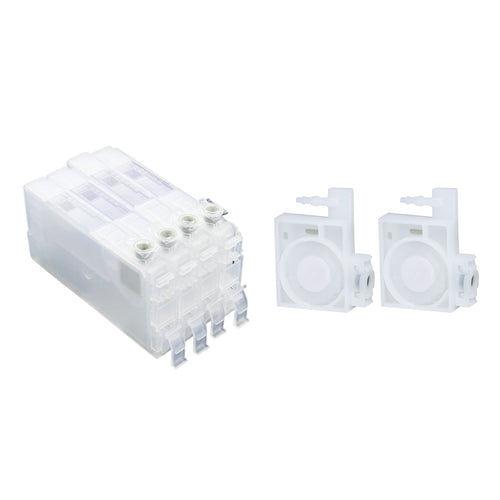If you're in the custom printing industry, especially working with Direct-to-Film (DTF) processes, you’ve probably heard about UV DTF ink. As a customer looking to invest in high-quality inks that deliver vibrant, durable prints on a wide range of substrates, you may have several questions. This guide is designed to provide you with all the essential information on UV DTF ink—from its fundamentals and benefits to practical tips for usage and maintenance.
Understanding UV DTF Ink
What Is UV DTF Ink?
UV DTF ink is a specially formulated ink designed for Direct-to-Film printing that cures rapidly under ultraviolet (UV) light. This rapid curing process is a key factor in achieving high-quality transfers with excellent durability.
Process Flow:
- Print designs on PET film with UV-curable ink.
- Apply adhesive powder.
- Cure ink instantly using UV light (365–405 nm wavelength).
- Transfer to substrates (textiles, glass, metal).
Most UV DTF ink systems use the following configuration:
- C(Cyan)
- M (Magenta)
- Y (Yellow)
- K (Black)
- w(White)-for underbase
- Varnish/Clear/Gloss - for a premium fnish and protection
InkSonic UV DTF printers are designed to handle this 6-color setup with precision, ensuring sharpness. vibrant, and durable prints on every job.
The Role of Each Ink Type
CMYK (Cyan, Magenta, Yellow, Black):
Used to create a full-color spectrum in printed designs. These are your primary color layers.
White Ink:
Serves as a base layer for printing on dark or transparent materials. White ink provides opacity and vibrancy, making the colors appear more vivid.
Gloss/Varnish Ink:
Used as a topcoat layer. It increases durability, scratch resistance, and imparts either a glossy or matte finish (depending on your RIP settings).
What Makes Good UV DTF Ink?
When selecting UV DTF ink, look for:
Performance Metric |
Ideal Quality |
Adhesion |
Strong bonding with A/B film and substrates |
Curing Speed |
Instant with LED UV lamp |
Color Vibrancy |
Bright, full tones without bleeding |
Stability |
Long shelf life and low odor |
Flow Consistency |
Smooth printing, no clogging or sediment |
Resistance |
Waterproof, UV-resistant, and scratch-proof |
InkSonic UV DTF Ink is specifically designed for use in UV direct-to-film (DTF) printing applications, offering exceptional print quality and vibrant, long-lasting colors.
In addition to its stable ink performance, ease of use, and excellent print quality,
💬What makes InkSonic's UV DTF Ink stand out is its high compatibility:
It is compatible with the InkSonic UV DTF printer VF13 as well as other devices equipped with Epson XP600 and DX7 printheads, allowing seamless integration with your existing equipment.
Wide Applications Of UV Ink
Energy-saving and environmentally friendly UV ink that cures and adheres through UV (ultraviolet) light exposure. It dries instantly, significantly reducing production and delivery times. From small accessories to large installations, architecture, and industrial design, it brings creative ideas to life with perfection.
Suitable Materials: PVC, PET, light film, canvas, PVC stickers, cold laminating film, plastic, rubber, CD/DVD, glass, metal, ceramic, acrylic, and other special hard or soft substrates.

Troubleshooting Common Issues
Even with the best equipment and practices, issues can arise. Here are some common problems and their potential solutions:
Issue: Ink Clogging
Cause: Inadequate mixing or changes in temperature and humidity can cause the ink to thicken.
Solution: Regularly shake the ink before use, clean the printhead frequently, and maintain a controlled environment. Using a compatible cleaning solution can help dissolve any clogs.
Issue: Uneven Color Distribution
Cause: Poor mixing or inconsistent curing can lead to uneven prints.
Solution: Ensure thorough mixing of the ink, and verify that the UV curing unit is operating at the correct intensity and wavelength. Running calibration tests before large print runs can also help.
Issue: Print Quality Degradation Over Time
Cause: Exposure to extreme environmental conditions or improper storage can deteriorate the ink’s quality.
Solution: Store the ink according to the manufacturer’s guidelines, and avoid prolonged exposure to direct sunlight or high temperatures. Regularly monitor the performance of older ink batches.
Issue: Poor Adhesion on Substrates
Cause: Incompatible substrates or insufficient curing.
Solution: Verify that your substrates are suitable for UV DTF printing. Ensure that your UV curing process is complete and that the exposure time is adequate. Sometimes a pre-treatment of the substrate may be necessary to improve adhesion.
How to Reduce Ink Costs Without Sacrificing Quality:
Use high-resolution designs, as low-quality images require more ink to compensate.
Set ink limits in your RIP software to prevent over-saturation.
Regularly calibrate the printhead for optimal droplet control.
Use original, compatible inks recommended by the printer manufacturer.
Use an ink system compatible with M'TuTech UV DTF printers to ensure top-tier results while avoiding printhead damage or warranty issues.
Storage & Handling Tips
Store inks in a cool, dry environment, away from sunlight.
Before using, shake the ink vigorously for at least 5s to ensure even consistency, as oil-based inks may settle.
Avoid leaving the cap open for extended periods. and always make sure the cap is tightly sealed after use.
For best performance, we recommend using the ink within 12 months of purchase.
Conclusion
UV DTF ink represents a significant advancement in digital printing technology. Its unique curing process, combined with its durability and versatility, sets it apart from traditional ink systems. Whether you’re in the custom apparel business, promotional product manufacturing, or any industry that demands high-quality, long-lasting prints, UV DTF ink can provide the performance and reliability you need.
When considering an investment in UV DTF ink, be sure to evaluate your current production needs, compatibility with your printer, and the range of substrates you intend to work with. By doing so, you can ensure that you choose an ink that not only meets your immediate requirements but also supports your long-term business growth and creative vision.





































